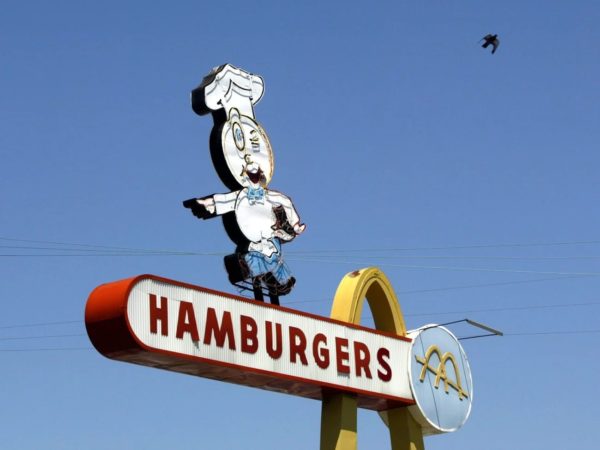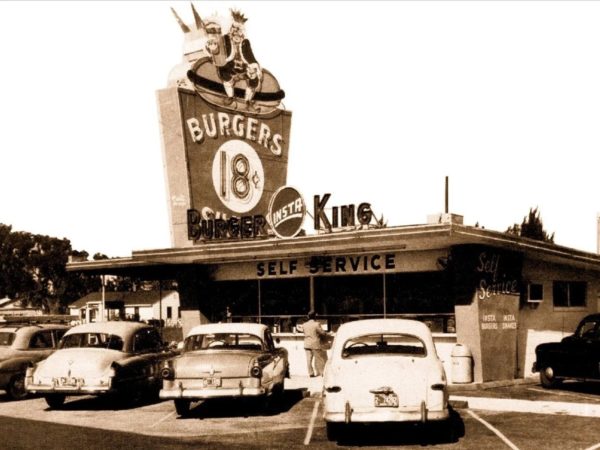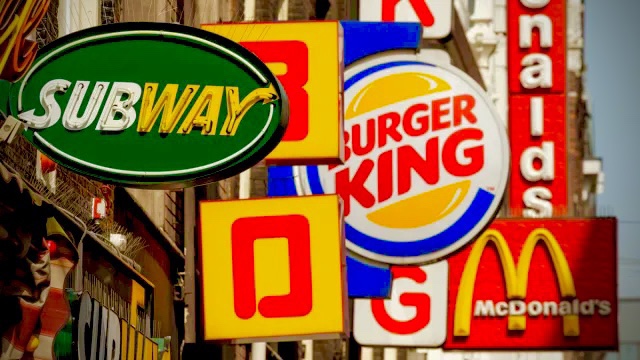When I played little league baseball in my hometown in the midwestern suburbs during the 80’s, every team was sponsored by a local small business. Their logos were silk screened proudly across the back of our jerseys, just below where our last names were ironed-on in block letters. It was an effective way for businesses to advertise and deepen their connection with the community. When someone asked you what team you were on, you’d say the name of the business, rarely your mascot, and it was never a chain store. Thirty years later, most of these small businesses in my hometown—hardware stores, furniture emporiums, pharmacies—that used to support sports leagues and park district activities have been subsumed by big box stores like Home Depot and Walmart. Drive through any suburban town and, along with the hollowed-out carcasses of malls and zombie shopping centers, you can see the decay of American dining. You’ll pass the same syndicate of chain restaurants repeating themselves in an endless matrix until it becomes nearly impossible to distinguish one township from another.
When the pandemic started, I wrote about my concern that losing so many independent restaurants would give chain brands an insurmountable competitive advantage. It has. The stocks of almost every publicly-traded restaurant chain, including many full-service restaurants that were initially hit hardest by lockdowns—like Brinker International (Chili’s), Darden Restaurants (Olive Garden) and Dine Brands (Applebee’s)—are trading at or near all-time highs with market caps well ahead of pre-pandemic levels. Of course, massive government stimulus has goosed the consumer recovery in tandem with historically low interest rates and accommodative monetary policy.
The data suggests that the pandemic is already strengthening the chokehold these well-capitalized companies have on the cities they inhabit. The sharps on Wall Street are already modeling how the demise of thousands of independent restaurants all but guarantee chain restaurants a bigger slice of the pie. Because of labor shortages and rising wages, the pandemic has forced many of these companies to invest heavily in automation to ensure the next crisis won’t be as debilitating. Public companies like Chipotle, Papa John’s, and Shake Shack have developed proprietary digital ecosystems for mobile ordering and curbside delivery. Most fast food transactions now require little to no human interaction. Though it seems counterintuitive, the pandemic may be the best thing that ever happened to chain restaurants.

Aggressive expansion fuels growth and buoys stock prices. Same store sales can only grow so much. Chipotle just recently guided same store sales at a paltry 5% annually. CEO Brian Niccol said on its earnings call that the company is focused on “throughput,” or ways of boosting production in their 2,853 locations. More burritos per second. But even if throughput stagnates, rapid expansion of new outlets makes lackluster same store sales easier to conceal on the company’s quarterly earnings reports. Niccol, the highest paid CEO in the restaurant industry at $38 million a year, also announced Chipotle’s intention to grow their North American footprint to 6,000 stores, more than double what it is today.
The main argument for allowing many of these multinational companies to flourish has always been that they create jobs. But they create mostly low-income, menial jobs. As these companies build more technological solutions, the need for human capital diminishes. But the bigger issue is how these companies siphon wealth from communities, using profits to enrich their shareholders. The cost of a cheap combo meal at your local Burger King or McDonald’s is much greater than what you pay at the counter.
The food media happily plays along, Stan-ing the latest chicken sandwich from this chain or that, stoking the flames of imaginary fast food wars, with little concern about whether the people who prepare the food are paid a living wage. Even a restaurant critic for the Washington Post recently lined up around the block for the new Jollibee, a fried chicken franchise that started in the Philippines. Meanwhile, over 10% of all U.S. restaurants have permanently closed since March of 2020. The biggest casualties have been small family-owned businesses, some that’ve endured world wars and depression. Every one of these businesses that closes takes a piece of their city’s history with them and is replaced with a Bojangles or a Jack-In-The-Box.
The Restaurant Revitalization Fund (RRF), created through the RESTAURANTS Act, was designed to support independent restaurants. The fund is already exhausted after distributing a total of $28.6 billion in aid through the Small Business Administration. A closer look at the numbers shows that one in ten recipients of RRF grants identified themselves as franchisees, satellites of larger conglomerates like Dunkin’ Donuts, Golden Corral, Subway and McDonald’s. Even strip clubs were among the list of restaurants that were granted money. Though many of these franchise owners are small businesspeople, a healthy portion of profits from their stores travel upstream to corporate tributaries. Whether inadvertently or not, the RRF is reinforcing the dominance of chain restaurants in communities that need more small business development. A proposal is currently on the table to replenish the fund with an additional $60 billion, but it faces an uphill battle in a divided Congress that has grown weary of being used as an ATM for every struggling industry. A similar bipartisan bill had already been introduced earlier this June without making it to the floor.
Politicians on both sides of the aisle welcome massive campaign donations from the National Restaurant Association, one of the most powerful lobbyists in Washington, and they only seem to care about fast food when it suits their political agenda. When Chick-fil-A, a company that’s made no effort to conceal its conservative values or anti-LGBTQ leanings, received blowback recently for a deal to bring its franchises to truck stops along the New York State Thruway, South Carolina Senator Lindsey Graham quickly came to its defense. “I hope we don’t have to,” he tweeted, “but I will go to war for the principles Chick-fil-A stands for.” For such a staunch supporter of states’ rights, Graham’s opinions about truck stops so far outside his jurisdiction were quite curious. It’s hard to imagine Graham taking such a hardline to protect a tiny soul food restaurant under siege because of its support for Black Lives Matter.
American companies that target middle America like Chik-fil-A propagate the illusion that they support the community in order to keep the profits churning. A recent ad campaign tells the heartwarming story of how the staff at a local Chik-fil-A helped a mother and daughter celebrate Mardi Gras when they couldn’t attend in person because of the pandemic. The company produced an entire series of these ads called “The Little Things,” where they focus on ways that Chik-fil-A puts community first. They’re almost comical pieces of propaganda, but Chik-fil-A is hardly alone in selling this fantasy. McDonald’s has been advertising “food, folks and fun” since the days of Ray Kroc.
Urban areas are not immune to the chain invasion. A recent report on Manhattan real estate leases showed that, despite a ten percent drop in retail rents, restaurant chains signed 23 new leases amounting to over 83,000 square feet of space in the last quarter alone. Among these 23 new leases is a Popeye’s franchise that plans to open in Times Square. It hardly comes as a surprise given how much hype the chain had for its new chicken sandwich in the New York media a few years ago, despite the fact that hundreds of independent restaurants in NYC can make a fresher and more flavorful one. But they can’t compete on price. Just like Amazon undercuts traditional brick-and-mortar stores to squeeze them out of business, these chains have a monopoly on cheap food.
Recent articles in the Washington Post and The Guardian point to the growing power that a handful of large companies have over the American food supply. Though most of Big Food’s power is centralized in grocery stores, fast food restaurants and casual chains have become efficient distributors of corporate food products that are engineered for longer shelf life from behemoths like Pepsi, General Mills, Conagra, Tyson, and Kraft Heinz. The supply chain is run like a complex drug ring where companies funnel their products into fast food restaurants where they can reach the most desperate addicts and keep them hooked. An entire economy is built upon large corporations doing everything they can to keep these products as cheap as possible to ensure that people will stay addicted to them. The food industry spent $175 million on political lobbying during the 2020 election cycle alone, and, as the economy reawakens, they’re eager to remove any further impediments to a swift return to growth.
To thrive long term, independent restaurants need creative policy solutions that are self-sustaining over time instead of one-off, lump sum payments like the ones the RRF provides. Introducing targeted taxes on large multinational restaurant corporations and the giant companies that supply them ingredients would be an effective way not only to stave off oligopolies but also to ensure that tax revenue goes directly toward supporting community-based entrepreneurship.
The Independent Restaurant Coalition—a consortium of industry figures led by celebrity chefs like Tom Colicchio and Andrew Zimmern—has been vocal in its support for replenishing the RRF, but it’s running out of arrows in its quiver. Lawmakers and advocates for federal aid don’t seem to have much of a backup plan if Congressional Republicans block further funding of the RRF.
One easy criticism of implementing targeted taxes is that it might force fast food companies to raise prices, thereby creating a secondary tax on underprivileged communities who can’t afford it. This may be true, but preserving the status quo and keeping fast food cheap is not much of a policy choice either. The problem is that fast food shouldn’t be treated as food when its peddled like drugs. Many states levy heavy taxes on cigarettes because there’s significant evidence that cigarettes kill. Adoption of anti-smoking laws didn’t happen overnight, and the tobacco lobby fought it tooth and nail. Some cities have tried to introduce taxes on sugary carbonated beverages. The budding marijuana industry is heavily taxed.

Taxing the fast food industry and its suppliers could be implemented in many different ways—based on a percentage of total revenue or on the quantity of new franchises a company opens, which will have the added benefit of tempering reckless expansion. Municipalities can implement local taxes on fast food restaurants, too, and earmark those funds for supporting new independent restaurants or facilitate more generous incentives to small businesses to make them more competitive.
Widespread availability of cheap fast food perpetuates our national obesity epidemic, a problem that worsens every year and contributes to the skyrocketing costs of healthcare. Supporting independent restaurants will give consumers better food choices and, since many small businesses will have shorter, localized supply chains, they can provide healthier food to communities with the added benefit of having a positive impact on the environment.
The United States doesn’t need cheap Big Macs to feed itself. We shouldn’t accept the idea that people need McDonald’s to survive. The longer we enable companies like McDonald’s to push their toxic products on the American people, pulling the wool over their eyes with deceptive, folksy marketing, the more we widen a nationwide public health crisis that includes higher rates of diabetes, heart disease, and stroke. Increasing taxes on chain restaurants can also help fund health and wellness programs or community-supported agriculture. None of these progressive measures will put any of these multibillion-dollar companies out of business, it will just stop them from siphoning wealth out of so many American communities, especially the ones that can least afford it.

